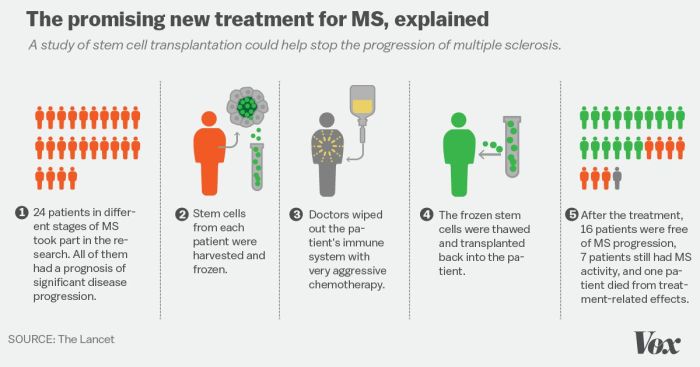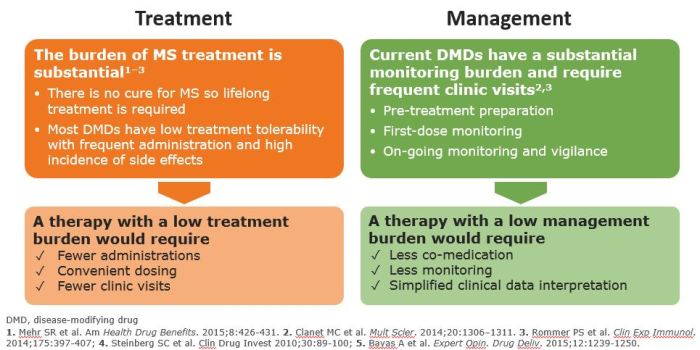Exploring the intricate relationship between lifestyle choices and the effectiveness of Multiple Sclerosis (MS) treatment, this guide dives deep into the various factors that play a crucial role in managing this complex condition. From diet and exercise to stress management and sleep patterns, each aspect is dissected to provide a holistic understanding of how lifestyle impacts MS treatment outcomes.
Furthermore, the discussion delves into the significance of medication adherence, the influence of social support, and the potential benefits of holistic approaches in enhancing the overall effectiveness of MS treatment.
 When it comes to managing multiple sclerosis (MS), lifestyle factors play a crucial role in determining the effectiveness of treatment. By making informed choices in areas such as diet, exercise, stress management, and sleep, individuals with MS can have a significant impact on their disease progression and symptom management.
When it comes to managing multiple sclerosis (MS), lifestyle factors play a crucial role in determining the effectiveness of treatment. By making informed choices in areas such as diet, exercise, stress management, and sleep, individuals with MS can have a significant impact on their disease progression and symptom management.
 Social support plays a crucial role in improving the outcomes of multiple sclerosis (MS) treatment. Having a strong support system can positively impact a patient's ability to cope with the challenges of MS and adhere to their treatment plan.
Social support plays a crucial role in improving the outcomes of multiple sclerosis (MS) treatment. Having a strong support system can positively impact a patient's ability to cope with the challenges of MS and adhere to their treatment plan.
Lifestyle Factors
 When it comes to managing multiple sclerosis (MS), lifestyle factors play a crucial role in determining the effectiveness of treatment. By making informed choices in areas such as diet, exercise, stress management, and sleep, individuals with MS can have a significant impact on their disease progression and symptom management.
When it comes to managing multiple sclerosis (MS), lifestyle factors play a crucial role in determining the effectiveness of treatment. By making informed choices in areas such as diet, exercise, stress management, and sleep, individuals with MS can have a significant impact on their disease progression and symptom management.
Diet
Diet plays a key role in MS management as certain foods can either exacerbate inflammation or support the immune system. A diet rich in fruits, vegetables, whole grains, and lean proteins can help reduce inflammation and provide essential nutrients for overall health.Exercise
Regular exercise has been shown to improve symptoms and overall quality of life for individuals with MS. Physical activity can help strengthen muscles, improve mobility, and boost mood, all of which are important factors in managing the disease.Stress Management
Stress can trigger MS exacerbations and worsen symptoms. Finding effective stress management techniques such as mindfulness, meditation, or yoga can help reduce the impact of stress on the body and improve overall well-being.Sleep
Adequate sleep is essential for individuals with MS as it plays a crucial role in immune function and overall health. Poor sleep can exacerbate symptoms and impact disease progression, making quality rest a priority for those living with MS.Medication Adherence
Ensuring medication adherence is crucial in effectively managing Multiple Sclerosis (MS) and preventing disease progression. Consistent use of prescribed medications can help control symptoms, reduce relapses, and improve overall quality of life for MS patients.Impact of Lifestyle Choices on Medication Adherence
- Poor Time Management: Busy schedules, irregular routines, or forgetfulness can lead to missed doses of medication.
- Dietary Habits: Certain foods or drinks may interact with MS medications, leading patients to skip doses to avoid potential side effects.
- Lack of Support System: Patients without a strong support network may struggle to stay motivated in taking their medications regularly.
Strategies for Improving Medication Adherence
- Establishing a Routine: Creating a daily schedule for medication intake can help patients remember to take their medications at the same time each day.
- Utilizing Reminder Systems: Setting alarms, using pill organizers, or smartphone apps can serve as helpful reminders for patients to take their medications.
- Open Communication: Encouraging patients to communicate any challenges or concerns about their medications with healthcare providers can lead to tailored solutions and support.
Social Support
 Social support plays a crucial role in improving the outcomes of multiple sclerosis (MS) treatment. Having a strong support system can positively impact a patient's ability to cope with the challenges of MS and adhere to their treatment plan.
Social support plays a crucial role in improving the outcomes of multiple sclerosis (MS) treatment. Having a strong support system can positively impact a patient's ability to cope with the challenges of MS and adhere to their treatment plan.
Enhancing Social Support Networks
- Joining MS support groups or online communities can provide individuals with a sense of belonging and understanding from others facing similar challenges.
- Family and friends can offer emotional support, practical assistance, and encouragement to stay committed to treatment regimens.
- Engaging in therapy or counseling can help patients navigate the emotional toll of MS and develop coping strategies with the help of trained professionals.
- Participating in social activities or hobbies can promote social connections and reduce feelings of isolation often associated with chronic illnesses like MS.














